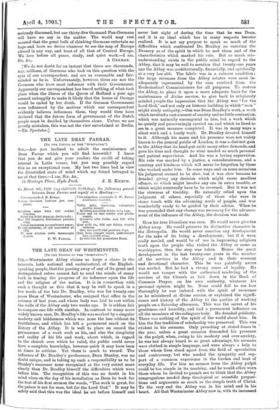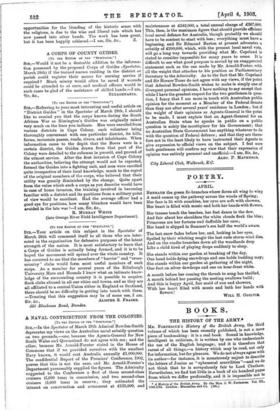THE LATE DEAN OF WESTMINSTER.
[To THE EDITOR OF THE "SPECTATOR.")
Sts,—Westminster Abbey claims so large a share in the interests, both national and ecclesiastical, of the English- speaking people, that the passing away of any of its great and distinguished rulers cannot fail to send the minds of many back in tracing the progress of its influence upon the life and the religion of the nation. It is in connection with such a thought as this that it may be well to speak in a few words of the late Dr. Bradley, who was for twenty-one years Dean of Westminster, who resigned that office in the autumn of last year, and whose body was laid to rest within the walls of the Abbey only two weeks ago. It is seldom fair to compare one life with another. In contrast to many more widely known men, Dr. Bradley's life was marked by a singular modesty and biddenness which was none the less without its fruitfulness, and which has left a permanent mark on the history of the Abbey. It is well to place on record the permanence of a work such as his, and also the simplicity and reality of his life and work, about which, in regard to the church over which he ruled, the public could never have a complete knowledge, however quick it may have been at times to criticise. Yet there is much to record. The influence of Dr. Bradley's predecessor, Dean Stanley, was no doubt unique, and in taking up such a responsibility as to be Stanley's successor none recognised at the very outset more clearly than Dr. Bradley himself the difficulties which were before him. The recognition of this was no doubt in his mind when on the day of his installation as Dean he took for the text of his first sermon the words, "The work is great, for the palace is not for man, but for the Lord God." It may he safely said that this was the ideal he set before himself and never lost sight of during the time that he was Dean, and it is an ideal which has in many respects become realised. It is not my purpose to speak so much of the difficulties which confronted Dr. Bradley on entering the Deanery as of the spirit in which he met them and of the characteristics which marked his rule. But so much mis- understanding exists in the public mind in regard to the Abbey, that it may be well to mention that twenty-one years ago the Abbey was architecturally, financially, and spiritually at a very low ebb. The fabric was in a ruinous condition; the large revenues from the Abbey estates were most in- adequately represented by the sum received from the Ecclesiastical Commissioners for all purposes. To restore the Abbey, to place it upon a more adequate basis for the maintenance of divine service, to give back to religiously minded people the impression that the Abbey was "for the Lord God," and not only an historic building in which" man" might study antiquity,—this was Dean Bradley's work, a work which involved a vast amount of anxiety and no little contention, which was naturally uncongenial to him, but a work which he quietly and perseveringly carried on, aud which he lived to see in a great measure completed. It was in many ways a silent work and a lonely work. Dr. Bradley devoted himself to it. Although his name and his presence were not widely known to the general public of London, it was a distinct gain to the Abbey that its head put aside many other demands, and gave his time and thought to what needed so much personal and patient supervision. And his was a loving supervision. His rule was marked by a justice, a considerateness, and a courtesy and kindness which will never be forgotten by those who worked under him. In some ways and on some occasions his judgment seemed to be slow, but it was slow because he dreaded giving any decision which might cause needless offence, or which might involve any one in extra trouble, or which might eventually have to be reversed. But it was not the slowness of timidity. He naturally, relied upon the judgment of others, especially of those who were in closer touch with the advancing needs of people, and was wonderfully ready to be guided by their advice. When he was persuaded that any change was necessary for the advance- ment of the influence of the Abbey, the decision was made.
Here his true liberalism was seen. He would never give the Abbey away. He would preserve its distinctive character in the Metropolis. He would never sanction any development for the sake of its being a development; but if it were really needed, and would be of use in impressing religious truth upon the people who visited the Abbey or came as worshippers, then the step was taken. Hence the great development in the last twenty-one years in the number of the services in the Abbey and in their reverent and devotional character. This he was painfully aware was needed. But he had a strong sense of legality. He would not tamper with the authorised rendering of the services of the Church as laid down in the Book of Common Prayer, on his own authority, whatever his personal opinion might be. None could fail to see how thoroughly be was imbued with the spirit of reverence as he ministered at divine service, or explained the signifi- cance and history of the Abbey to the parties of working people on a Saturday afternoon. This was the secret of his gentleness and humility, and had a permanent influence on all the members of the collegiate body. He dreaded publicity. There was nothing of the spirit of the world about him. In him the fine tradition of scholarship was preserved. This was evident in his sermons. Only preaching at stated times in • the year, unless a great occasion demanded his presence in the pulpit, when, owing to his modesty and over-anxiety, he was not always heard to so great advantage, his sermons were clothed in simple language, and were always a help to those whose lives stood apart from the field of speculation and controversy, but who needed the sympathy and sup- port of a common experience in the burden and heat of everyday life. For him no sermon from the Abbey pulpit could be too simple in its teaching, and he would often warn those whom he invited to preach not to think that the Abbey congregations needed deep theological or scientific proposi- tions and arguments so much as the simple truth of Christ. To the very end the Abbey was in his mind and in his heart. All that Westminster Abbey now is, with its increased opportunities for the blending of the historic sense with the religious, is due to the wise and liberal rule which has now passed into other hands. The work has been great, but it has been happily achieved.—I am, Sir, &c., Z.











































 Previous page
Previous page